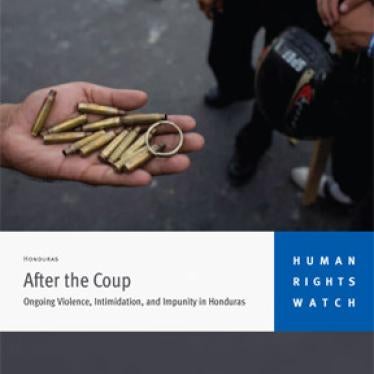(Washington, DC) - Honduran authorities should conduct a prompt, thorough, and impartial investigation into the serious threats received recently by a prominent human rights defender, Leo Valladares Lanza, Human Rights Watch said today. Valladares is Honduras' former ombudsman and the former president of the Inter-American Commission of Human Rights.
Valladares told Human Rights Watch that he has received intimidating phone calls, and noticed people monitoring his home and following him, after he questioned the increasing power of the Honduran military since the 2009 coup. In mid-February 2011, Valladares said on a television show that the Armed Forces had too much influence in government affairs. Sandra Ponce, the head of the Human Rights Unit of the Attorney General's Office, and Ana Pineda, the human rights minister, said they will investigate the threats, media reports said.
"The Lobo administration's inability to ensure that human rights defenders can do their job and express their views without reprisals is frustrating," said José Miguel Vivanco, Americas director at Human Rights Watch. "If someone with Leo Valladares' experience and international exposure is getting serious, credible threats, it is crystal clear that the human rights community in Honduras is facing risks."
Over the past three weeks, unknown people repeatedly called Valladares' home. The callers asked to speak to Valladares's son Rodrigo, who was killed in January 2009, and then laughed. Valladares told Human Rights Watch that the calls frightened him and his family because no one has been held accountable for Rodrigo's death.
On February 21, a prosecutor who witnessed a taxi driver following Valladares asked the police to accompany Valladares home. A few days later, when Valladares saw the same taxi driver standing in front of his home, he called the police. After interrogating the driver, the officers told Valladares and his family that they should leave the country and adopt other security measures.
Valladares is currently out of the country due to a prior academic commitment, but will return to Honduras shortly, he told Human Rights Watch.
Valladares was the ombudsman of Honduras between 1992 and 2002. During his tenure, his office prepared the first official, preliminary report on the country's "disappeared." He recently retired from the Autonomous University of Honduras, where he taught law for 45 years. He was involved in nongovernmental organizations in Honduras for decades, and currently directs the Association for an Active Citizenship (Asociación para una Ciudadanía Activa).
States have a special obligation to protect human rights defenders against risks that they may face as a direct result of their work. The Inter-American Court of Human Rights emphasized the importance of the work of human rights defenders when it indicated, for example, that "respect for human rights in a democratic state depends largely on human rights defenders enjoying effective and adequate guarantees so as to freely go about their activities, and it is advisable to pay special attention to those actions that limit or hinder the work of human rights defenders."
In December 2010, Human Rights Watch released a report, "After the Coup: Ongoing Violence, Intimidation, and Impunity in Honduras," documenting the state's failure to ensure accountability for abuses committed under the country's de facto government in 2009. The report also documents 47 cases of threats or attacks - including 18 killings - against journalists, human rights defenders, and political activists since the inauguration of President Porfirio Lobo in January 2010. The lack of accountability - and ongoing violence and threats - have had a chilling effect on free speech and political participation in Honduras, particularly among those who opposed the 2009 coup, the report says.
"It is critically important for prosecutors to take this investigation seriously," Vivanco said. "The government needs to take all necessary measures to ensure Valladares's safety when he returns to Honduras."







